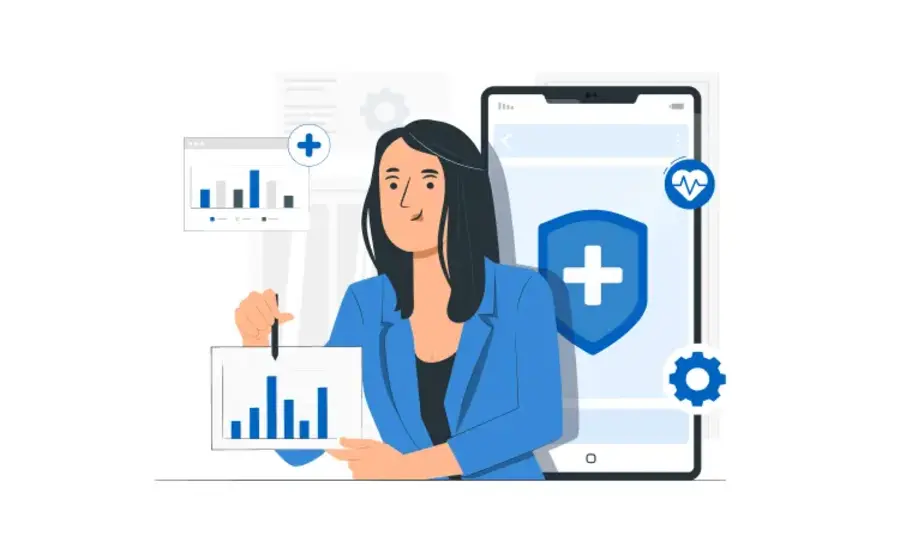The healthcare industry is undergoing a digital revolution, with telemedicine and medicine delivery apps transforming the way patients access healthcare. In 2025, medicine app development will play a critical role in providing accessible, on-demand healthcare services, ensuring patients have an easier, more efficient way to access medical care and medications.
Whether it’s telemedicine app development, healthcare app development for companies, or on-demand medicine delivery app development, incorporating advanced features and seamless functionality is crucial. Let’s explore the essential features of medicine app development for 2025, highlighting how these features meet evolving patient needs, enhance accessibility, and streamline medical services.
Key Statistics Driving the Growth of Medicine Apps
Before diving into the features, let’s consider some statistics that showcase the potential and growth trajectory of telemedicine and medicine app development:
- Global telemedicine market is expected to reach $396.76 billion by 2027, growing at a CAGR of 25.8% from 2021 to 2027. This growth reflects the increasing demand for virtual healthcare services, making telemedicine app development a high-value investment for companies in 2025.
- On-demand medicine delivery services have seen rapid growth post-2020. By 2025, this market is projected to grow by over 17% annually as more consumers embrace digital solutions for convenient and fast medication delivery.
- Healthcare app development for companies that provide solutions to support remote consultations, prescription refills, and on-demand delivery has increased by 45% in the past two years, showing that digital platforms are a mainstay in modern healthcare.
These numbers emphasize the growing reliance on telemedicine and digital health apps for meeting patient needs, establishing medicine app development as a future-forward solution in the healthcare industry.
Essential Features of Medicine App Development for 2025
A successful medicine app needs to focus on user experience, advanced healthcare integration, and security, along with innovative features that make accessing healthcare easy for patients. Here are the essential features every medicine delivery app development company should consider for future-ready medicine apps:
1. User Authentication & Profile Management
For a medicine app, a secure and seamless registration process is essential. Users should be able to register through multiple options, such as email, phone number, or even social media integration.
- User Profiles: Each user can create and manage their profile, including medical history, prescription records, and preferred payment methods.
- Multi-User Support: The option to manage family profiles within a single app account ensures convenience for users who may also be caregivers.
2. Integrated Telemedicine Services
Incorporating telemedicine into medicine apps provides users with instant access to healthcare professionals. Telemedicine app development enhances the app’s usability by allowing users to connect with doctors directly for consultation and prescriptions.
- Video & Audio Consultations: Patients can consult doctors through secure video or audio calls for quick assessments, diagnoses, and prescriptions.
- E-Prescription Management: Digital prescriptions generated by doctors are instantly shared with users, which can be forwarded to pharmacies for delivery.
3. Advanced Search and Categorization
The app should offer an intuitive search function that allows users to find medicines, healthcare products, and pharmacies quickly.
- Smart Search Filters: Users can filter results based on brand, price, delivery time, and availability.
- Category-Based Listings: Medicines can be categorized by type, like OTC, prescription, and healthcare essentials, making it easier for users to find the products they need.
4. Prescription Upload and Verification
To comply with healthcare regulations, medicine apps should feature a secure prescription upload option. This allows users to upload a valid prescription, which the app then verifies to ensure compliance with regulatory standards.
- OCR Technology: Using Optical Character Recognition (OCR), the app can read prescriptions to verify authenticity and manage inventory accordingly.
- AI-Based Prescription Validation: AI can help flag any inconsistencies, reducing the risk of fraudulent prescriptions.
5. On-Demand Medicine Delivery
With on-demand medicine delivery app development becoming a standard, this feature allows users to get their medications delivered to their doorstep, improving convenience and compliance with treatment regimens.
- Real-Time Delivery Tracking: Users can track their order status and delivery progress in real-time.
- Delivery Scheduling Options: Patients can schedule their delivery times based on their preferences, ensuring they receive medication when it is most convenient.
6. Inventory Management and Real-Time Stock Updates
Medicine apps should feature real-time inventory tracking to manage stock levels accurately, avoiding any “out-of-stock” issues for high-demand medicines.
- Stock Alerts and Notifications: The app can alert users if a medicine is low in stock or inform them when it becomes available again.
- Real-Time Inventory Syncing: With real-time syncing between multiple pharmacies, users have access to a wider range of medications from different suppliers.
7. Data Security & Compliance
Given the sensitive nature of healthcare data, it is essential for any healthcare app development company to prioritize data security by implementing encryption protocols and complying with relevant regulations such as HIPAA and GDPR.
- Two-Factor Authentication (2FA): Adds an extra layer of security during user login.
- Data Encryption: Ensures sensitive health information and transaction data are stored and transmitted securely.
8. Automated Refill Reminders
To support medication adherence, apps can feature automated refill reminders. This feature ensures users are reminded to refill their prescriptions before they run out.
- Customizable Reminders: Patients can set reminders according to their daily medication routine, reducing missed doses.
- Automatic Refill Orders: If a prescription is pre-approved, the app can place automatic orders to ensure the user never runs out of essential medications.
9. AI-Powered Health Insights and Recommendations
Artificial Intelligence can provide users with insights based on their health data, giving them recommendations for lifestyle improvements or medication adjustments.
- Personalized Health Recommendations: Based on user data and medical history, the app offers insights for preventive healthcare.
- Medication Interaction Warnings: AI can detect possible interactions between prescribed medications, helping users avoid adverse effects.
10. Multi-Language and Accessibility Support
With a diverse patient demographic, medicine apps should offer multi-language support and accessibility features for users with disabilities.
- Language Preferences: Users can choose their preferred language, which makes the app accessible to a broader user base.
- Voice Recognition for the Visually Impaired: Integrating voice commands for essential features can help users with disabilities navigate the app with ease.
11. 24/7 Customer Support and In-App Assistance
An in-app customer support system with live chat and AI-based FAQs can enhance user satisfaction, ensuring they receive help whenever needed.
- AI Chatbots: Can handle basic questions, assist with navigation, and help users complete orders.
- Emergency Support: Real-time support for emergency orders can help users who require urgent medication assistance.
Benefits of Future-Ready Medicine Apps for Users and Providers
By 2025, healthcare app development companies will be focusing on providing solutions that not only benefit patients but also streamline operations for healthcare providers and pharmacies. Some notable benefits include:
- Enhanced Patient Convenience: Medicine apps provide patients with a convenient way to manage their health, reducing the need for in-person visits.
- Increased Medication Adherence: Features like automated reminders help patients stay consistent with their prescriptions, improving health outcomes.
- Improved Access to Healthcare: Telemedicine features bridge the gap for patients in remote locations, providing them with access to professional healthcare.
- Data-Driven Insights for Providers: AI and data analytics can provide healthcare providers with valuable insights into patient health trends, helping them offer proactive care.
Challenges and Future Trends in Medicine App Development
Despite the benefits, there are challenges that medicine delivery app development companies may encounter, including regulatory compliance, data security, and integration with existing healthcare systems. In 2025, medicine apps will likely incorporate these advancements:
- Blockchain Technology: For enhanced data security, blockchain can provide tamper-proof records of all transactions and patient data exchanges, increasing transparency.
- AR & VR for Virtual Examinations: Augmented Reality (AR) and Virtual Reality (VR) could become integrated with telemedicine for more immersive remote examinations.
- Wearable Integration: Medicine apps will increasingly sync with wearables, allowing for real-time health monitoring and personalized treatment suggestions.
Conclusion
As we approach 2025, medicine app development is expected to bring about significant advancements, addressing modern healthcare needs with a strong focus on user accessibility, data security, and telemedicine integration. These essential features make medicine apps more than just digital tools; they become vital connectors between patients and healthcare providers.
For healthcare companies and pharmacies looking to develop or enhance a medicine app, the future holds exciting opportunities to redefine patient care. With the right combination of features, security, and innovative technology, telemedicine app development, on-demand medicine delivery, and overall healthcare app development will continue to play a pivotal role in making healthcare accessible, efficient, and patient-centered in 2025.










